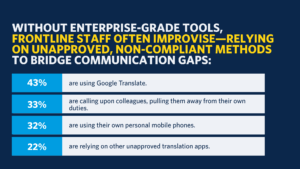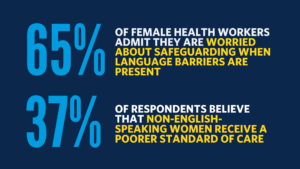Bridging the Gap: Tackling Language Barriers in Female Healthcare
Language barriers are creating significant risks in female healthcare, impacting patient safety and quality of care. A recent report from Pocketalk reveals a troubling reality: healthcare professionals are losing valuable time, and non-English-speaking women may be receiving a poorer standard of care. The data highlights an urgent need for safe, reliable, and instant translation solutions to protect both patients and staff.
Our independent survey of 500 healthcare workers in female primary and secondary care paints a clear picture. Over a quarter of these professionals encounter language barriers every single day. This isn’t just an occasional inconvenience; it’s a persistent challenge with serious consequences.
The Hidden Cost of Language Barriers in Female Healthcare
When communication breaks down, the effects are felt across the board. From wasted time to heightened safeguarding risks, the lack of effective translation tools puts immense pressure on an already strained system. The findings from our survey quantify the scale of this problem.
Lost Time and Resources
Our research shows that healthcare professionals spend an average of two hours per week navigating language barriers with female patients. This adds up to more than 12 working days a year lost to a challenge that modern technology can solve. This is time that could be spent providing direct patient care, reducing waiting lists, or managing other critical tasks. Instead, it is consumed by the struggle to communicate effectively.
A Serious Threat to Patient Safeguarding
Perhaps the most alarming finding is the impact on patient safety. A staggering two-thirds (65%) of female health workers admit they are worried about safeguarding when language barriers are present. Effective communication is the bedrock of safe and dignified care. Without it, how can a clinician be certain a patient understands their diagnosis, consents to treatment, or can accurately describe their symptoms?
The concern is not unfounded. More than a third (37%) of respondents believe that non-English-speaking women receive a poorer standard of care. This disparity is a direct consequence of communication failures, and it underscores the critical need for equitable access to healthcare for all, regardless of the language they speak.
Unsecure Workarounds: A System Under Pressure
In the absence of official, enterprise-grade tools, frontline staff are forced to improvise. Our survey uncovered a widespread reliance on unapproved and non-compliant methods to bridge the communication gap.

The data reveals a worrying pattern of improvisation:
- 43% are using Google Translate.
- 32% are using their own personal mobile phones.
- 33% are calling upon colleagues, pulling them away from their own duties.
- 22% are relying on other unapproved translation apps.
While these actions are driven by a desire to help, they introduce serious risks. Consumer-grade apps and personal devices are not designed for clinical settings. They often lack the necessary security protocols, fail to comply with GDPR, and may store sensitive patient data, creating significant privacy and safeguarding concerns. This isn’t just about inefficiency—it’s about safety, dignity, and equality in care.
The Solution: Secure, AI-Powered Translation

There is a clear desire for change from those on the front line. Our survey found that 36% of healthcare workers believe more support is needed, and nearly two-thirds (64%) agree that new technology is not utilised enough in female healthcare. This should be a wake-up call for the industry.
Technology that can solve these challenges already exists. Pocketalk provides AI-powered translation solutions that are built for high-stakes environments like healthcare. Our software and hardware are secure, GDPR-compliant, and approved for use across NHS trusts and private health organisations.
Unlike consumer tools, Pocketalk’s proprietary Prism Language Systems engine never stores conversational data, ensuring every interaction is private and secure. It delivers instant and accurate translation across 92 languages, empowering clinicians to communicate with confidence and clarity.
Jess O’Dwyer, General Manager at Pocketalk, explains, “When clinicians are forced to choose between using unofficial tools or leaving a patient misunderstood, it’s a clear sign that the system isn’t giving them what they need. Translation tools that incorporate AI to enhance efficiency have the potential to safeguard both staff and patients – but it must be secure, GDPR-compliant and enterprise-grade.”
Welcoming Everyone to the Conversation
As we work to improve equity across women’s health services, tackling language barriers with modern, safe solutions must be a priority. The need is urgent, and the time to act is now. By equipping healthcare professionals with the right tools, we can eliminate communication barriers, improve patient safety, and ensure every woman receives the high-quality care she deserves.
Our work with 25 health settings in the UK and 30 in Ireland, particularly within female healthcare departments, shows that the right technology can make an immediate and positive impact.
Some conversations are too important to be missed. Discover how Pocketalk can help your organisation provide safer, more equitable care. Explore our secure translation solutions for healthcare today.